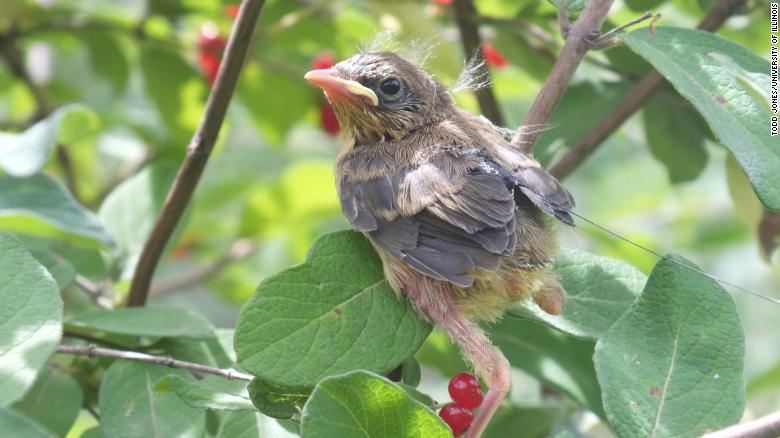You may admire the birds in your garden for their commitment to their young — endlessly catching bugs and delivering them back to the brood of chicks in their nest.
But researchers from the University of Illinois have uncovered a darker side to songbird parenting. They have found many species deliberately evict their young chicks — before they are ready to fly.
The study, led by the university’s College of Agricultural, Consumer and Environmental Sciences, looked into the behavior of 18 songbird species in various habitats across the United States and found they all forced some of their chicks out of the nest.
The scientists assessed a number of papers stretching back as far as 2004 to draw their conclusion, researching the behavior of species including the Acadian flycatcher, brown-headed cowbird, indigo bunting and worm-eating warbler.
The paper, published in the Proceedings of the National Academy of Sciences, found all of the species studied “manipulated” some of their offspring into leaving the nest early.
They do this, the researchers believe, by decreasing the amount of food they give them, to force them out with hunger, and by communicating with them directly to encourage them to leave.
Todd Jones, a doctoral student at the University of Illinois and the lead author of the paper, explained that the birds engaged in this behavior because they appear to be more focused on the “collective survival of the brood versus individual survival of each offspring” and wanted to ensure they passed on only the strongest genes.
By having fewer birds in the nest, he told CNN, the parents aim to boost the overall likelihood of being able to successfully raise at least one of their offspring to independence.
“Rather then leaving all their eggs (or in this case nestlings) in one basket, they can get their offspring to leave the nest earlier and spatially separate the brood such that that probability of all offspring being eaten becomes nearly zero. This benefit comes at the cost, however, of survival prospects for each individual offspring,” he told CNN.
“We generally think of songbirds in our backyards as these devoted parents that feed and defend their young. While this is true, our study also reveals a darker side to these parents,” he added.
Survival of the fittest
“This being said, songbird parents generally appear to be highly invested and devoted to their offspring, incubating, provisioning, and defending them for four to six weeks. In fact,” Jones said, “while studying these birds there were a number of times where researchers were struck on the head by parents defending their young.”
He noted that other bird species — which were not included in the study — were far more “severe” when it came to ensuring survival only of the fittest.
“American Coots will deliberately attack and sometimes kill less valuable young so that the rest of the brood has a better chance to survive. Likewise, in storks, cranes, egrets and herons, parents may only feed the oldest offspring, kill less valuable offspring, or allow older offspring to kill their younger siblings so that they or their remaining brood are more likely to survive,” he added.
>>>details




